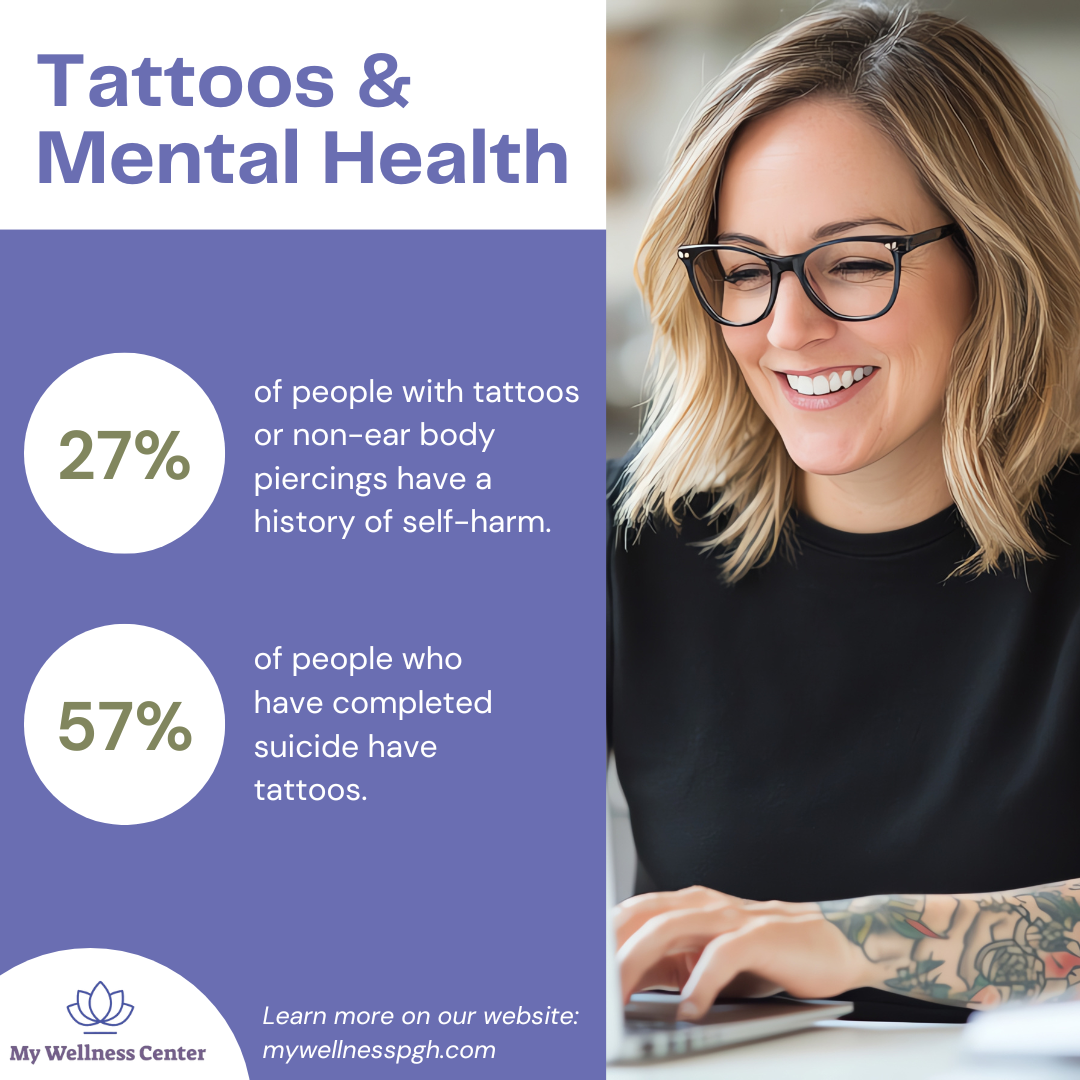Humans have a fascinating history with tattoos. Although the first known tattoo was found in the Alps on Ötzi the Iceman (estimated to be from 3370-3100 BCE), modern society largely rejected tattoos until a few decades ago.
Today, though, the Pew Research Center has found:
- 32% of Americans have at least one tattoo.
- 22% of Americans have more than one tattoo.
The stigma against tattoos is quickly evaporating in the United States, and tattoos in physical locations that have generally been frowned upon—like on the hands or even on the neck or face—are growing more widely accepted.
But despite this welcoming of personal expression and body modifications, there remains an undercurrent of concern.
Research shows a correlation between tattoos and mental health issues. In other words: People with tattoos are more likely to:
- struggle with mental health
- have a history of mental health struggles
Use our table of contents to jump to the section most relevant to you, or continue reading to learn more about how tattoos, mental health, and therapy services go together!

Table of Contents
Links Between Tattoos and Mental Health
What Therapy Has Taught Us About Tattoos and Mental Health
Find A Pittsburgh Therapist
Links Between Tattoos and Mental Health
Although the data around tattoos and mental health is constantly evolving, especially as tattoos become more commonplace in society, recent studies have linked tattoos with mental health issues.
Here’s what some of the research shows:
Tattoos and Self-Harm
A recent German study evaluated hundreds of adults with tattoos or non-ear body piercings to search for connections between these body modifications and instances for self-harming and similar behaviors.
Their finding: 27% of individuals with tattoos or non-ear body piercings have a history of self-cutting.
Compare this to the rate of non-suicidal self-injury (NSSI) among the rest of the population. Although studies vary, only 2%-17% of people in general engage in NSSI at least once in their life.
While this elevated rate among individuals with tattoos and non-ear body piercings is alarming, so is another finding: Some of these study participants felt “healed” by their body modifications, and they even stopped self-harming after receiving their tattoo or non-ear piercings.
Tattoos And Suicide (And Early Death)
Additional studies have shown a correlation between tattoos and suicide and between tattoos and a greater risk of an unnatural death (in other words, death caused by something other than natural causes).
Some recent findings:
- One study determined 57% of individuals who completed suicide had tattoos, while only 29% of individuals involved in “accidental deaths” had tattoos.
- Another study found having a tattoo made someone more likely to be associated with a younger age at death, especially through unnatural manners like gunshots or drug overdoses.
Overall, research seems to connect receiving a tattoo with a willingness to engage in riskier behaviors.
Tattoos And Self-Esteem
Tattoos have been shown to positively boost one’s sense of self, making them more confident and self-assured.
A 2015 Harris Poll found:
- 33% of individuals with tattoos say they felt more sexy because of their tattoos.
- 32% of these individuals felt more attractive.
- 27% felt more rebellious.
For some, these characteristics can boost overall quality of life and mental well-being—especially among individuals who use tattoos to cover up the trauma and scars of the past.
What Therapy Has Taught Us About Tattoos and Mental Health
As therapists, we have a unique perspective on both tattoos and mental health journeys, as we often discuss both tattoos and mental health with our patients.
Here are some of our observations:
Tattoos Can Represent Your Personal Journey
Tattoos often act as milestones on a person’s emotional or psychological timeline.
For some individuals, a tattoo marks the beginning of a new chapter—a recovery from addiction, a fresh start after a breakup, or the end of a traumatic experience. For others, a tattoo serves as a visual anchor during challenging times, reminding them of how far they’ve come or what they’ve survived.
We’ve worked with clients who’ve chosen symbols of resilience, quotes of affirmation, or abstract art that captures an emotion they once struggled to put into words. In this way, tattoos become more than just body art—they become a deeply personal reminder of inner strength, survival, and self-discovery.
Tattoos Can Cover Up Painful Moments From the Past
For individuals who have self-harmed in the past or who have been the victim of assault or abuse, tattoos can physically cover scars—ugly reminders of traumatic experiences. For some, covering these scars is an act of reclaiming the self by literally overcoming the past.
Tattoos Can Commemorate the People, Places, and Events Most Important to You
Some of the most emotionally significant tattoos we see in therapy are the ones that honor a deep bond or memory. Whether it’s the initials of a loved one who has passed, coordinates of a meaningful location, or a date etched in Roman numerals, these tattoos serve as permanent tributes to what truly matters most.
Grief, loss, and love are complex emotions that don’t always lend themselves to language. For many, a tattoo can express what words cannot. These tattoos don’t just preserve memories—they create a physical connection to those moments and people, turning the body into a canvas of remembrance and meaning.
Tattoos Can Become A Form of Therapy
As that German study demonstrated, receiving a tattoo can “cure” mental health issues. While there are multiple theories surrounding why this may be the case, one of the biggest is the actual act of receiving a tattoo.
Depending on the size and location of the tattoo, sitting in the chair can be a physically painful experience, which can be therapeutic for some individuals.
In addition, engaging with a tattoo artist can be a therapeutic experience. Like bartenders and hair stylists, tattoo artists often listen to their clients’ problems for hours on end, giving the recipient an opportunity to unburden themselves of the emotional baggage they’re carrying.
Find A Pittsburgh Therapist
While tattoos are fun and beautiful, they’re rarely a replacement for traditional therapy. If you have a mental health issue you’d like to overcome, contact us. Our experienced, empathetic therapists will ensure you receive the care you deserve.

